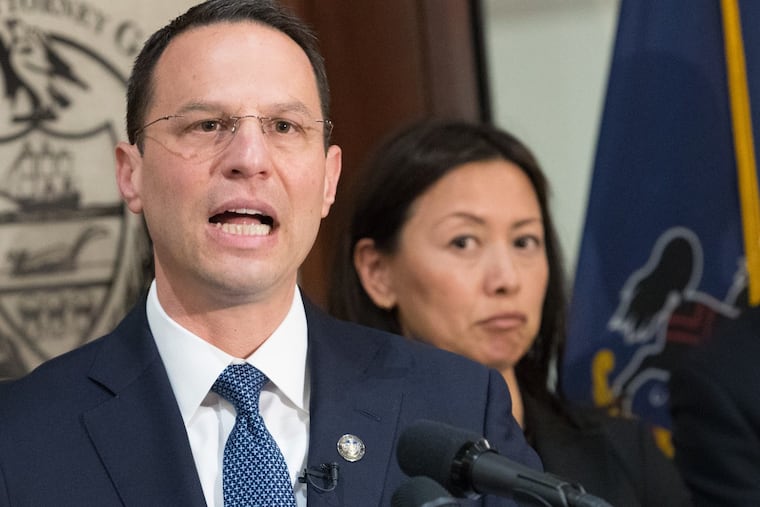In sharp filings, lawyers for past and present clergy attack grand jury report
In court documents released Friday, lawyers for current and former clergy named in a pending grand jury report on abuse within six dioceses sharply criticized the investigation. A spokesman for Attorney General Josh Shapiro defended the work of prosecutors and calls the criticism "desperate."

Lawyers for current and former clergy in six Pennsylvania Roman Catholic dioceses named in a pending grand jury report on child abuse have ripped the massive document as full of "gross mischaracterizations and falsities," and say it rides roughshod over the rights and reputations of clergy and church officials.
In their filings, the lawyers revealed new details of the extensive probe, including the disclosure that the report names at least 90 abusive clergy who officials suggest belonged to the Pittsburgh Diocese alone.
That's more than the number named in the sweeping 2005 grand jury report on abuse in the Philadelphia Archdiocese, an inquiry considered to be among the most thoroughly researched clergy-abuse reports nationwide.
In more than a dozen separate legal attacks, the lawyers question even the legal basis for the two-year grand jury investigation, which produced a report nearly 900 pages long chronicling abuses and cover-ups in six of Pennsylvania's eight dioceses, including Pittsburgh and Scranton.
The lawyers, in filings to the state Supreme Court made public Friday, say the law establishing statewide grand juries limits them to going after mobsters and corrupt politicians, not clergy or church officials who harm children.
State prosecutors under Attorney General Josh Shapiro were "not permitted to use grand juries as freewheeling instruments of reform. This is what legislatures are for," the attorneys assert.
One lawyer, Efrem Grail, wrote that prosecutors "cannot use the grand jury process in a manner not authorized by statute, for publicity, or as a focus for elected officials' pet" projects.
The lawyers bluntly criticize Shapiro, lambasting him for vouching for the accuracy of the report and for his denunciations of the appeals. Shapiro's office, one attorney said, has "deeply poisoned the well of public sentiment" through its public remarks. Another suggests the attorney general violated ethical rules for lawyers.
Joe Grace, spokesperson for Shapiro, fired back later Friday.
"There isn't a morsel of truth to their allegation," he said in a statement. "Their desperate claim speaks volumes."
The grand jury report, on ice pending the result of the state Supreme Court appeals, explores abuse going back decades in the Allentown, Harrisburg, Erie, and Greensburg Dioceses, as well as Pittsburgh and Scranton. In 2016, the Attorney General's Office released a report on the Altoona-Johnstown Diocese. Two tough reports on the Philadelphia Archdiocese came before that. Thus, the release of the new document would mean every diocese in Pennsylvania had been scrutinized.
Prosecutors have offered those named in the report the chance to write rebuttals that would be packaged with the documents. Their lawyers dismissed this as a mere opportunity to "vent," and demanded that their clients be given a full hearing in advance of any release of their names, to give them a shot at clearing their records.
In one filing, attorneys with the Philadelphia firm of Saul Ewing Arnstein & Lehr, representing all the clergy, say unmovable prosecutors have "imbued the report with the sanctity of holy writ."
"The irony is not lost on the petitioners, given their lives' work," they add.
Much of the court fight has played out in secret. Only recently did the justices order that documents related to the case be made public, although in redacted form. Nine media organizations, including the Inquirer and Daily News and the Pittsburgh Post-Gazette, have petitioned the court for access to the full report.
The filings made public Friday were heavily censored, with scores of pages that provided the Supreme Court with information about the specific allegations against priests blacked out. Even so, the filing shed light on the issues in the court fight.
Stephen Stallings, the lawyer for someone identified only by the initials T.K., said the report levels "anonymous, unsubstantiated and disputed allegations" about conduct that might not have been criminal even if true. There never was an arrest in the incident, his filing says.
The attorneys for the estate of a deceased priest, identified only as L.O., argued that prosecutors were "irresponsibly … branding him as a pedophile." That priest appears to be the Rev. Lawrence O'Connell, a priest in the Pittsburgh Diocese who died in 1986. Three women sued the diocese in the 2000s, saying O'Connell fondled them when they were girls decades earlier.
They joined other a handful of other survivors who collectively accused 17 former and current priests as abusers. The diocese settled in 2007 for $1.25 million.
One of the petitioners, identified only as T.S., is asking the court to redact any identifying information from the grand jury report, including initials and biographical material. The petition notes that prosecutors cite documents, namely church records, that include misconduct allegations. But attorney Blair Hindman argued that the underlying allegations remain "untested."
"The commonwealth casts a wide net, without regard for those who are innocent, bringing its unmatched power and treasure to overwhelm anyone who dare present a challenge," Hindman wrote. "The court is the only thing standing in the commonwealth's way."
Staff writer Nathaniel Lash contributed to this article, as did Liz Navratil of the Harrisburg Bureau and Peter Smith of the Pittsburgh Post-Gazette.